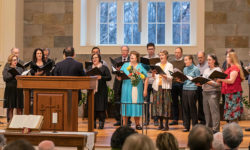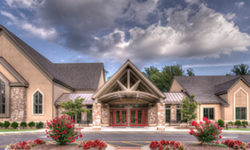
Essentials of Faith: Communion
February 10, 2022 | Lindsei Lansky Luciano
This week continues a 4-post series from Family Ministries on the “Essentials of Faith,” intended to parallel what the Kids/Youth/ Adult “Discipling the Next Generation” Sunday School classes are studying during the month of February. We hope to share Stone Hill’s position on these essential doctrines, provide a few guidelines, and remind the church of the beauty and truth of these traditions and beliefs.
Communion is a picture or symbol of the past events – the Passover and the Last Supper – the present, as we remember his death and resurrection together, and the future, as we look forward to celebrating and feasting together in eternity.
On Jesus’ last day with His disciples, he used the Passover meal to prepare them for what was coming. After that meal, His blood was shed as an offering, and that meal’s meaning would be fully revealed. Jesus knew the complete meaning of Passover from the first time it was celebrated, so He chose it purposefully and told His disciples a lesson about Himself with unleavened bread and wine.
The bread is a symbol of Jesus’ body. His body was torn as he offered Himself to all who believed in His saving power. We take broken bread to remember His ultimate sacrifice for us. Taking the bread together joins us as one body under His headship.
The wine (juice) is a symbol of blood. Jesus first used wine to symbolize the blood of the Lamb and the ways God rescued His people from slavery (Ex. 6:6). In this same way, Jesus was shedding His blood to rescue us from the enslaving power of sin. (Ex. 24:6-8)
Just as the Israelites were called to celebrate their freedom as a community, so as believers, we are called to celebrate the freedom Jesus has given us at the cross. This is why we celebrate communion regularly–we remember and proclaim the Lord’s death until He comes (I Cor. 11:26).
Questions that might be discussed in your family:
- When is my child ready to start participating in communion?
- SHC recommends that a child is baptized first to show that they understand who Jesus is and their relationship with him. This is often a sign that they are ready to understand the symbolism of communion. Conversations with your child regarding their commitment to Jesus and understanding of His finished work are also a good indicator of their understanding of the importance of communion.
- What if I’m struggling with a persistent sin? Should I still partake?
- Confession is a key part of communion. All have sinned and fallen short of the glory of God (Rom. 3:23). Confessing our sins should be a regular part of our spiritual life. Setting aside time for confession before and during communion is an important step in this regular confession of sin. When we fully recognize our sin, and our need for his death and resurrection, we can fully experience his gospel power in our lives (Mark 2:17).
- Why do we regularly celebrate communion?
- We celebrate regularly to continually be reminded of our need for Jesus’ grace and work in our lives. Just as food and drink sustain our physical health, we need the remembrance of His finished work to sustain our spiritual health.






